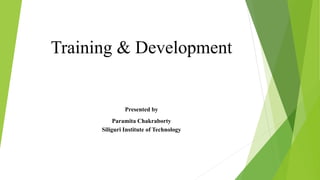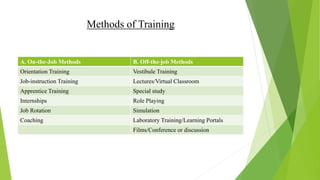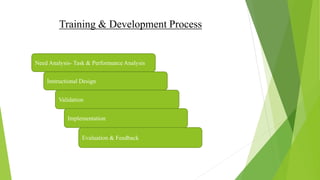Training & Development.pptx
- 1. Training & Development Presented by Paramita Chakraborty Siliguri Institute of Technology
- 2. Education is the process of imparting theoretical teaching/learning in classrooms Training is the process of imparting skills. Development is the exposure of employees to general subject and attitudinal aspects of overall self improvement aimed at helping employees to grow and assume responsibilities in higher positions
- 3. Training is the act of increasing the knowledge and skills of an employee for doing a particular job ŌĆō According to Flippo ’üĄ Executive or management development is a planned, systematic and continuous process of learning and growth by which managers develop their conceptual and analytical abilities to manage. ’üĄ Concept of Training: ’üĄ The entire philosophy of training rests on the principles of learning. A successful training programme will begin with successful identification of training needs and creation of right kind of environment for conducting the same. The trainer should have the requisite skills and expertise, choose appropriate methods, have a pleasing personality, and also be able to relate the value of training to the enterprise.
- 4. Training efforts must invariably follow certain learning oriented guidelines, which may be summarized as follows: ’üĄ Intention to Learn ’üĄ Reinforcement ’üĄ Developing Potential ’üĄ Active Participation ’üĄ Effect of Practice ’üĄ Transfer of Learning
- 5. Objectives of Training ’üĄ Induction ’üĄ Skill Up gradation ’üĄ Preparing for Future Assignment ’üĄ To improve productivity and quality ’üĄ To prevent accidents ’üĄ To avoid boredom, monotony and fatigue ’üĄ To support personal growth and development
- 6. Education ’üĄ Wider scope compared to training ’üĄ Process of increasing the knowledge and understanding ’üĄ KSA development across several situations ’üĄ Imparted through schools/ colleges/ self learning ’üĄ Generally theory based
- 7. Training ’üĄ Generally limited to increasing knowledge and skill related to job being performed. Primary focus is job operative ’üĄ Focuses on job related competencies and imparts job related skills ’üĄ Generally directed towards non-management personnel ’üĄ Present focused ’üĄ To overcome the existing performance problems ’üĄ Training is practice based and company specific
- 8. Development ’üĄ Acquire KSA for future responsibilities ’üĄ More general than training, individual specific, but related to company and most often aimed toward management people ’üĄ Generally focus on non-technical organizational functions such as negotiation skills, problem solving, decision making, leadership skills etc. ŌĆō managerial skills ’üĄ Directed towards managerial personnel ’üĄ Focus is to develop an employee for higher level responsibilities, long term association with the company
- 9. Differences between Training & Development Basis Training Development Focus Learn specific actions; demonstrate techniques and processes Understand and intercept knowledge; Develop judgments and decision making Time Frame Short Term Long Term Process Tries to improve a specific skill relating to a job (mostly technical and mechanical) Tries to improve personality of an individual(mostly through behavioral technique Goal Meet current requirements of a job; aims at improving performance on current job Meet future challenges of the job and the individual Effectiveness Measures Performance Appraisal, cost benefit, passing tests and certificates Qualified people available when needed, promotion from within possible, HR based competitive advantage
- 10. Importance of Training Benefits to the Organisation Benefits to the Employees 1.Trained workers are effective and efficient 2.They handle machines properly and wastage is reduced 3.Fewer accidents 4.Micro managing / close supervision may not be required 5.Trained workers exhibit better performance 6.Produce better quality products 7.Growth opportunities are better 8.Become more loyal to the organization 1.Finds job work easy 2. Puts in less effort to achieve results 3. Facilitate growth and promotions 4. Realize career goals faster 5. Makes him better in the job market and more mobility 6. Handle the job with confidence, hence increase of morale 7. Can cope better with organizational change
- 11. Methods of Training A. On-the-Job Methods B. Off-the-job Methods Orientation Training Vestibule Training Job-instruction Training Lectures/Virtual Classroom Apprentice Training Special study Internships Role Playing Job Rotation Simulation Coaching Laboratory Training/Learning Portals Films/Conference or discussion
- 12. Vestibule training Apprenticeship Virtual Classroom Informal Learning
- 13. Training & Development Process Need Analysis- Task & Performance Analysis Instructional Design Validation Implementation Evaluation & Feedback
- 14. Thank you














